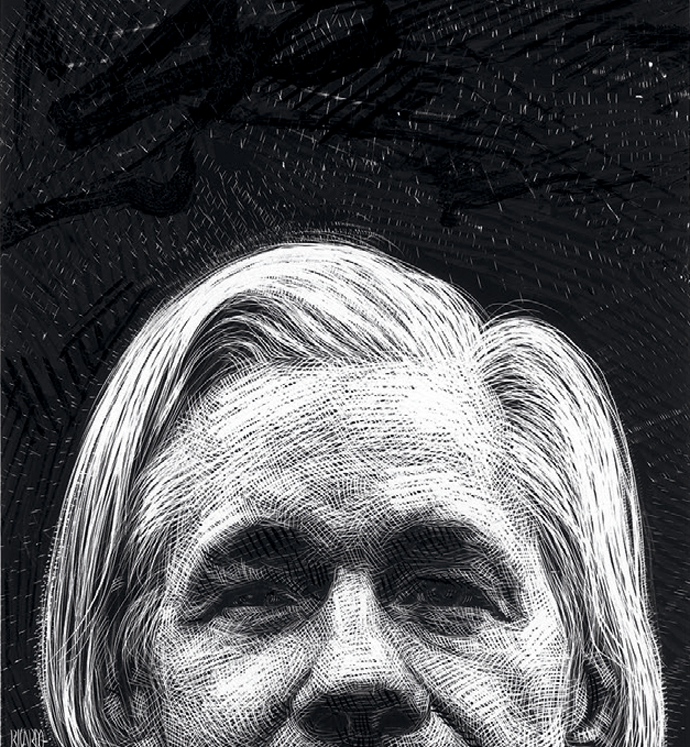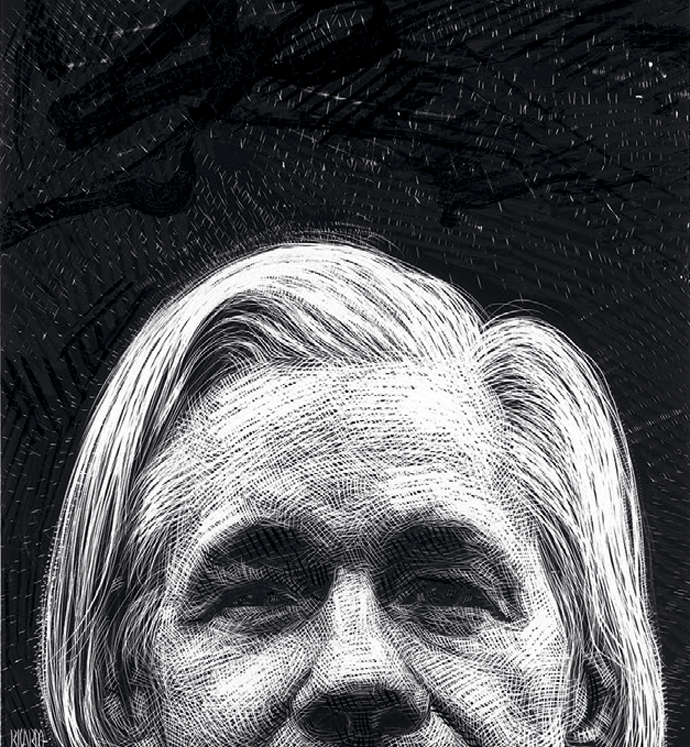Last fall, a court filing in the Eastern District of Virginia inadvertently suggested that the Justice Department had indicted WikiLeaks founder Julian Assange. The Wall Street Journal, the New York Times, and other outlets reported soon after that Assange had likely been secretly indicted for conspiring with his sources to publish classified government material and hacked documents belonging to the Democratic National Committee, among other things.

Illustration by Ricardo Martínez
As a veteran of major free-press legal battles, I waited, throughout the days that followed, for journalists to come to Assange’s defense. A few reliable advocates, such as the ACLU and the Knight First Amendment Institute, did sound the alarm, but the editorial boards of the Times and the Washington Post remained silent.
The Columbia Journalism Review allowed that Assange’s prosecution “could be a slippery slope that would threaten traditional journalists and publishers,” but it was quick to note that WikiLeaks was a “shadowy organization” and “not officially a journalistic one.” (Of course, there is no body, not even the CJR, that determines what is “officially” a journalistic outfit.)
Overall, the same mainstream journalists who have treated Donald Trump’s disparaging tweets about them as unprecedented threats to their freedom handled Assange’s indictment as a political story, another piece of the ongoing Trump–Russia saga.
In fact, the Trump Administration’s prosecution of Assange represents a greater threat to the free press than all of the president’s nasty tweets combined. If the prosecution succeeds, investigative reporting based on classified information will be given a near death blow.
Julian Assange started WikiLeaks in 2006 with the stated purpose of providing a place for newsworthy information to be released on a confidential basis. The site came to widespread international notice a few years later, when Assange obtained thousands of classified documents relating to the Iraq War from US Army soldier Chelsea (née Bradley) Manning. Assange in turn shared these documents with Le Monde, El País, Der Spiegel, the Guardian, and the Times, each of which separately edited and published what they’d received.
Amid the furor surrounding this publication, politicians from across the political spectrum—Senators Dianne Feinstein and Joseph Lieberman among them—called for Assange’s prosecution. Barack Obama’s Justice Department seriously considered indicting Assange under the Espionage Act and convened a grand jury for that purpose. The legal theory behind such a prosecution involves charging Assange with conspiring with Manning to release classified materials. Using this “conspiracy” theory, the Espionage Act would be made to apply to a reporter—not directly but indirectly—by using the reporter’s relationship with sources. In other words, the reporter would be made responsible for the actions of his sources. (Manning was eventually convicted under the Espionage Act for leaking to Assange.)
The Justice Department has been enamored of this conspiracy approach since the time of the Pentagon Papers. In that case, Richard Nixon’s DOJ attempted to enjoin the New York Times and, later, the Washington Post from publishing a forty-seven-volume Defense Department study of the history of US relations with Vietnam from 1945 to 1967, which had been classified top secret. I led the team of lawyers who defended the Times in that case. I had advised the Times that the government would attempt to enjoin publication and thereafter would attempt to prosecute the Times criminally. I also advised the Times that it would win any case brought against it in the Supreme Court, on First Amendment grounds.
In June 1971, the Times published three installments of the papers and was enjoined from further publication, as I had predicted. The Washington Post then picked up where the Times left off, and both papers ended up in the Supreme Court, which ruled
in their favor. The court’s decision is now widely considered a legal landmark, since it effectively determined that no injunction could be brought to stop publication of classified material.
The ruling did not, however, determine that newspapers or their reporters were immune from prosecution after the fact. Following the Supreme Court’s decision, attorney general John H. Mitchell convened a grand jury in Boston to determine whether there was a conspiracy among Times reporter Neil Sheehan and others with respect to the publication of the Pentagon Papers. After a year and a half, the Justice Department gave up and dissolved the grand jury.
Since Assange has already published the leaks in question, he obviously cannot be stopped from publishing them now; all the government can do is prosecute him criminally for obtaining or publishing the leaks in the first place. To date, there never has been a criminal prosecution for this type of behavior. Obama’s Justice Department ultimately concluded that a prosecution of Assange would damage the First Amendment. Their decision effectively meant that Assange was entitled to the same constitutional protections given reporters. (A Washington Post story about this decision quoted Obama officials who referred to the “New York Times problem”—i.e., the fact that any precedent set with respect to Assange could be applied to traditional journalistic entities.)
Trump’s Justice Department has reversed course on this decision. When Jeff Sessions first came into office as attorney general, he said that one of his top priorities would be going after Assange. Secretary of State Mike Pompeo—then the director of the CIA—said, “It is time to call out WikiLeaks for what it really is: a non-state, hostile intelligence service often abetted by state actors like Russia.”
While no one knows what’s in the DOJ’s indictment, it is highly probable that it names Assange as a co-conspirator not only in connection with the Manning leaks but also in connection with the leaks of emails stolen from the DNC and from Hillary Clinton’s campaign chair John Podesta, as well as the leaks of classified information detailing the CIA’s ability to perform electronic surveillance (the so-called Vault 7 matter).
With respect to the DNC/Podesta leaks, Assange is in the crosshairs of special prosecutor Robert Mueller, who apparently believes that he may have conspired with Russian intelligence and perhaps additionally with members of the Trump campaign to leak the emails. Assange denies both that he received the emails from Russian intelligence and that he provided information to the Trump campaign.
Mueller’s January indictment of the former Trump campaign adviser Roger Stone alleges that Stone tried to communicate with Assange through two intermediaries: radio host Randy Credico and political commentator Jerome Corsi. After laying out these allegations, Mueller indicted Stone for lying about his contacts with Credico and Corsi, and for attempting to get Credico to lie before Congress about their conversations. In a later filing, Mueller contended that he had executed search warrants on accounts that contained communication between Stone and “Organization 1,” understood to be WikiLeaks. (Stone has pleaded not guilty to all charges.)
Not all of the facts about the DNC leaks have come out yet, so it is hard to know exactly what Assange did. If he explicitly agreed to act as a Russian agent, he should lose his First Amendment protection. On the other hand, if he did no more than what he did with Manning—receive the documents and publish them—he should have that protection. The same is true with respect to the Vault 7 matter: the facts concerning these leaks are not known, but the application of the conspiracy theory to these leaks is presumably the same as in the DNC hack.*
* Assange may also be indicted for assisting Edward Snowden’s flight to Russia, since Sarah Harrison, an Assange adviser, accompanied Snowden on that flight. It has yet to be proved that Assange directed her to do that. Regardless of how this charge plays out, it should not disturb Assange’s First Amendment protection for his other actions. Additionally, Assange was arrested on Swedish rape charges in 2010; his current asylum in the Ecuadorian Embassy in London began after the UK attempted to extradite him on those charges in 2012. In May 2017, Sweden dropped the charges.
Should Trump’s Justice Department succeed in prosecuting Assange, the only safe course of action for a reporter would be to receive information from a leaker passively. As soon as a reporter actively sought the information or cooperated with the source, the reporter would be subject to prosecution. National security reporting, however, is not done by receiving information over the transom. It is naïve to think that reporters can sit around waiting for leaks to fall into their laps. In a recent interview, the longtime investigative reporter Seymour Hersh told me that he obtains classified information through a process of “seduction” in which he spends time trying to induce the source into giving up the information. If he isn’t allowed to do that, he says, “It’s the end of national security reporting.”
It’s clear that the Justice Department believes such “seduction” creates a conspiracy between the leaker and the reporter. In its prosecution of the State Department employee Stephen Jin-Woo Kim for leaking classified information about North Korea to a Fox News reporter, James Rosen, the DOJ stated, in a sealed affidavit, that it considered Rosen a “co-conspirator.” The DOJ filed the affidavit with the D.C. District Court in 2010 to gain access to Rosen’s email, which showed him persuading Kim, asking for the leak time and time again until Kim finally relented. The affidavit was unsealed three years later, to the shock of Rosen and many other journalists. When Fox News angrily protested that Rosen’s First Amendment rights prevented him from being a co-conspirator, the Obama Justice Department assured Fox that it would not prosecute him. If this type of conspiracy theory were to be applied in a criminal trial, a court would end up examining every effort by a reporter to obtain information. It would criminalize the reporting process. Reporters and their publishers would argue that the First Amendment protected news-gathering efforts such as Rosen’s, but the result would be in doubt in every case.
If reporters can be indicted for talking to their sources, it will mean that the government has created the equivalent of a UK Official Secrets Act—through judicial fiat, without any legislative action.
Given the threat the Justice Department’s actions against Assange pose to the First Amendment, why haven’t more journalists, press organizations, and editorial boards jumped in to support him? Principally it is because journalists dislike what he is doing; they don’t believe he is a “real” journalist and therefore do not see him as entitled to the same protections they enjoy.
Writing in U.S. News and World Report, for example, Susan Milligan says, “[Journalism] requires research, balance and most of all judgment. . . . Dumping documents—some of them classified—onto a website does not make anyone a journalist.” Add to this my own experience of when I was attacked several years ago by a howling mob of A-list journalists led by the late Morley Safer at a party (for my own book) where I said Assange, as a reporter, was entitled to First Amendment rights. “He is just a data dumper,” I was told—and most everyone there agreed.
But he’s not just a data dumper. He edited the Manning leaks initially, holding back some material. He may have done the same thing with his other leaks, including the Vault 7 releases. For better or for worse he seeks out information to be published on his website the way other journalists do for their publications. He is a publisher and is entitled to the same First Amendment protections as any other. Nonetheless, in the eyes of establishment journalists he remains a dumper, as well as a rapist, a liar, a thief, and a Russian agent.
One wonders whether the real reason journalists will not support Assange is that they simply don’t get it. They don’t understand how a successful prosecution of Assange would threaten their ability to report. I would suggest that the focus of the mainstream press should not be on whether Assange meets the usual definition of a journalist or whether they approve of what he does. That’s not the point. The point is that he carries out the functions of a journalist, has First Amendment protections (as they do), and should not be prosecuted for what he does. If he is, we are all worse off for it.
You are currently viewing this article as a guest. If you are a subscriber, please sign in.
If you aren’t, please subscribe below and get access to the entire Harper’s archive for only $23.99/year.

